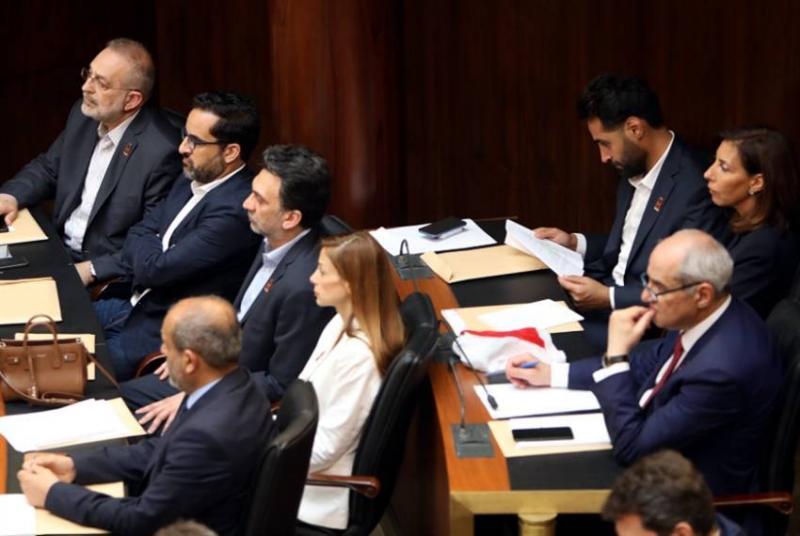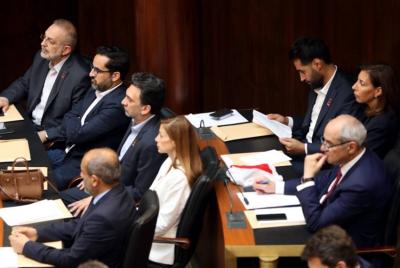With the dawn of each year, new beginnings and hopes emerge as people wish to improve their personal and public circumstances. Change is a constant in existence, as the Greek philosopher Heraclitus stated, yet societies do not always seize opportunities for survival in moving towards the future, pulling their present from the horrors of the past. Change is measured by its success and ability to overcome obstacles on one hand, and on the other, by the self-belief of change advocates and the alignment of their behaviors and policies with their mindsets and beliefs.
The year 2022 in Lebanon recorded many political, economic, security, and health events, yet it represented a pivotal moment for the forces of change to reap the fruits of the sacrifices and struggles seeded by the October 17 uprising through the ballot boxes last May. The uprising succeeded in sending 13 MPs to parliament, breaking into the electoral circles and party environments of all sectarian colors, while being unable to penetrate the fortified walls of the "Shia duo" on one hand, and the established narrative of "conspiracy" and targeting of "resistance" in their community on the other. However, the parliamentary victory and popular elation quickly faded, along with promises and dreams. What had united "the revolution" in its various ideological and demand-oriented forms was divided by political entitlements, revealing in the parliamentary seats the cracks in approaching issues. The "change makers" found themselves entangled among each other instead of confronting the authority. The blunders accumulated with each test, from the elections for the president of the council, his deputy, the secretariat, and committees, to the election of the president of the republic, where fragmentation reached its peak. The "October people" competed in the game of "my slogan is stronger than yours," proposing presidential names with or without the consent of their owners. The change did not stop there; their bloc transformed, some withdrew, and others resigned or were dismissed from their political movements. Was this a change in the opposite direction or a natural process in the evolution’s course?
In an interview with "Nidaa Al-Watan," MP Najat Saliba stated that "the performance of the change makers within the parliament met the required level, and they achieved successes in managing sessions and proposing laws." Although this year marked the entrance of the "change makers" into the parliamentary assembly, it introduced schisms among them with the first decisive entitlement in the organization of the state and its institutions, namely the presidential elections. Saliba believes that "despite the disputes among the change makers and allowing them the freedom to decide on the presidential candidates, the goal was to localize the entitlement, preventing the creation of a president abroad to be imposed on us." Regarding the fragmentation of MPs or the lack of unification among them into a single parliamentary bloc, she noted that the "change makers" do not "constitute a single party, as each party has its own vision and approach to political issues and solutions, but we all agree on basic principles that unite us, namely love for Lebanon and working sincerely for its salvation, setting aside our personal and party interests if they exist, in favor of the nation and its citizens." Amid rising discontent in the popular circles of the October 17 uprising, Saliba indicated that “there is no country in the world that has managed to achieve the desired change within six months," emphasizing that “change within parliament will take its gradual and ascending course over the next three years.”
Retired Colonel and geopolitical researcher Khalil Halou, who is considered one of the prominent figures accompanying the October uprising from its field and organizational beginnings, evaluates its revolution, elections, and the behaviors of its MPs without self-flagellation or reverence, but rather poses the issues realistically and rationally. He believes that "the revolution was initially launched by citizens resentful of the social and political reality and the absence of the state’s sovereignty and authority, and its popular momentum continued from October 17 until Independence Day on November 22. However, it has gone through many fluctuations and stages, from the oppression meted out by the "Shia duo" and their allies to its complex mosaic formation of leftists and change makers wanting to take the revolution in their direction through slogans of overthrowing the regime and holding sectarianism accountable for the country’s problems, alongside a group of opportunists and components rejecting the social condition yet closer to the resistance axis in their political views, in addition to sovereign forces." Therefore, Halou confirms that "unifying these factions under the umbrella of the revolution was not possible." He pointed out that "the theft of the revolution by some forces and imposing their slogans while marginalizing the remaining components away from the eyes of the masses, alongside the entry of deliberate and supported sabotage factors from the "resistance," all contributed to the fragmentation of electoral lists and the failure of the majority of change makers to enter the council. This fragmentation led many of the protesters to return to their parties and vote for their candidates."
Moving to the parliamentary scene, despite the criticisms, Halou emphasizes the positives of the 13 MPs, seeing that they "initially succeeded in maintaining their cohesion and imposing a new mentality within the general assembly, as it is no longer possible for the council’s president Nabih Berri to control the approval of laws and manage sessions as before, offering hope to the Lebanese youth of the capacity for change and entry into the parliamentary assembly, and breaking the taboos and sanctities regarding discussions within the legislative authority." Conversely, he criticizes the “sovereignty shyness” of some change makers, stating that "this is a serious issue, as no political or economic reforms can be conducted or foreign investments attracted without a sovereign state capable of exercising authority over its territory." Responding to some change MPs’ claims that they maintain the “purity of the revolution” in parliament by avoiding engagement with current parties, he comments: "Let them maintain their purity in their homes. In public affairs, cooperation with others is fundamental to legislative work. Parliaments around the world cooperate with each other to achieve national interest, as happens in the United States where Republicans and Democrats come together on common domestic and foreign issues, despite their competition and distance on others."
Halou also criticizes "some of them leaning towards cooperating with the resistance forces more than interacting with the sovereign forces, as it is enough for someone to say that 'the Forces' for instance say 'this is white' for others to immediately respond 'it is black,' and despite the attempts by the "Kataeb" party to approach them, they refuse, which indicates political and national immaturity. Perhaps what placed the "change MPs" under the sword of criticism this year the most was their confusion in handling the presidential entitlement, characterized by scattered voices, absence of vision, and lack of agreement on a single candidate."
In conclusion, Halou sees that "the coming year is an extension of the previous years, as Lebanon has been mired in its crises for 50 years, and no solutions are in sight. Regarding hopes for a renewed popular movement, he stresses that 'a hungry population does not revolt, and the history of revolutions is evidence of this,' holding the main parties and forces accountable for their failure, as they are capable of mobilizing the street. A revolution without leadership is like a body without a head." In summary, this year has not been the year of the desired change; while the dreams and expectations of the people place a heavy burden on their representatives, it is true that "much is required from those who have been given much." The 13 MPs are expected to limit their fragmentation in the new year following the emergence of a nucleus of new parliamentary bloc or more, including members like Halima Qaqour, Ibrahim Mneimneh, Cynthia Zarazir, and Firas Hamdan, alongside MP Osama Saad, supported by Melhem Khalaf and Paula Yacoubian. Meanwhile, the joining of MPs Mark Dao and Najat Aoun Saliba after Waddah Sadek and Yasin Yasin to support presidential candidate MP Michel Moawad signaled an alliance among them, while MP Elias Grady voted alone for former minister Ziad Baroud, marking the year’s last setback for the "change makers" with the Constitutional Council's decision to nullify Rami Fang's seat, making it accurate to assert—albeit in reverse—that "the children consume their revolution."




